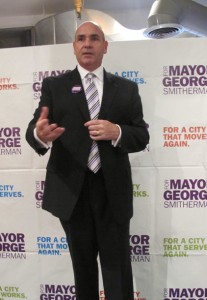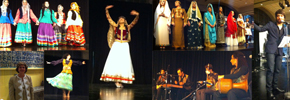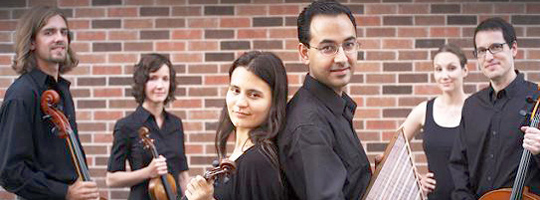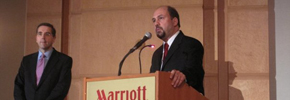Sima Sahar Zerehi – The name Pierre Elliot Trudeau still holds special power over immigrant communities in Canada. While other Canadians remember Trudeau as our country’s rare rock-star politician, exuding the kind of bravado and magnetism that is rarely seen today, in a political era dominated by Prime Ministers in sweater-vests; immigrant communities often herald Trudeau as the father of multiculturalism.
It’s no secret that Trudeau and his legacy in the late 60’s and 70’s as the fifteenth Prime Minister of Canada have done wonders for the Liberal Party. In fact, we can argue that the Liberal Party’s diversity posters featuring various ethnic and racial communities would have never been possible if it hadn’t been for Trudeau.
Even today, more than forty years later, the name Trudeau is still used as shorthand by socially progressive Liberals to speak about the importance of minority rights and diversity.
So it’s no surprise, that when speaking with Smitherman, the “T” word quickly came up.
“My roots in politics is Pierre Trudeau, this is the politics of multiculturalism, and this is the politics of the protection of the minorities in a legal sense, through the Charter of Rights and Freedoms.”
Smitherman who has positioned himself as a champion of minority communities sees Toronto as a city of diversity.
He states, “The city is immigrant communities.”
Speaking of his opponent, mayoral candidate Rob Ford, Smitherman remarks, “He sees a Toronto where he divides everybody up.”
Channeling Ford he states, “those people over there they don’t fit into my vision of Toronto and they’re not part of my Toronto.”
From his perspective Smitherman believes that “Toronto is only Toronto because all these minority pieces come together to make one, so to me if you take the immigrant experience out, there is no Toronto left.”
But Smitherman is not just another privileged middle-aged white-guy waxing-on about the minority experience during the election season. Despite his mainstream appearance, Smitherman also identifies with the minority experience.
He states, “I’m from a minority community too. I don’t look like a minority, I’m a white man and I’ve enjoyed privileged responsibilities. But as a gay person, I know that’s controversial to some, I come from a community that is in tune with the minority experience.”
Most politicians who are from the lesbian or gay communities would shy away from speaking about their sexual orientation, particularly when being interviewed by an ethnic publication. But Smitherman refuses to hide in the closet and sees his status as a gay man as a point of connection and not division from immigrant communities.
He explains, “I come from a community that suffers discrimination, sometimes persecution; in recent history even persecution at the hands of the police. I think these things give me an advantage of understanding what happens when minorities are singled out.”
Although Smitherman is frank about the challenges he faced early on in his political career – trying to build relationships with various ethnic and religious communities as an openly gay man – he refuses to allow these divisions to dominate his political outlook.
“If we wake up in the morning and we focus on the things that make us distinct from our neighbours, rather than focus on the things that we have in common, then it’s over,” declares Smitherman.
Smitherman’s message is about building bridges, establishing relationships of mutual respect and focusing on common interest.
“All Torontonians need is a city government that makes it possible to move around; all citizens of Toronto need a government that wants to help them achieve economic opportunity and the independence and freedom that stems from it,” notes Smitherman.
He concludes our discussion by stating, “My Toronto is the sum of all its parts and that’s what makes it so powerful.” Smitherman adds that if elected mayor he wants to make Toronto “a city as powerful as it is big.”






it looks you do not know Trudea or you do not Smitherman in order tpo milseading your readers
for some Liberal ads do not wrtie bias articles.
for your info to see that most the platform of Forda and Smitherman are the same by
By Thomas Walkom _ sep 25-2010 Toronto Star
All of this might be explicable if Ford were a true outlier, if all other serious mayoralty candidates were promising something different. But except for leftish councilor Joe Pantalone, all are on the same wavelength, calling for deep spending cuts and privatization.
George Smitherman, who according to the polls is in the number two spot, says he’s the only one who can stop Ford. But even if he does, what difference would that make? On important issues, the platforms of the two men (yes, Ford does have a platform) are eerily similar.
Both would attempt to cut spending in ways that aren’t fully defined; both would contemplate contracting out garbage collection; both would hire more cops.
Both would slash the vehicle registration tax and curb the growth of bike lanes on major streets. Both would scrap current TTC expansion plans and instead concentrate on more subways.
In fact, Smitherman’s platform is more extreme. He would freeze property taxes which, when done in the past, has sent the city spiralling into debt.